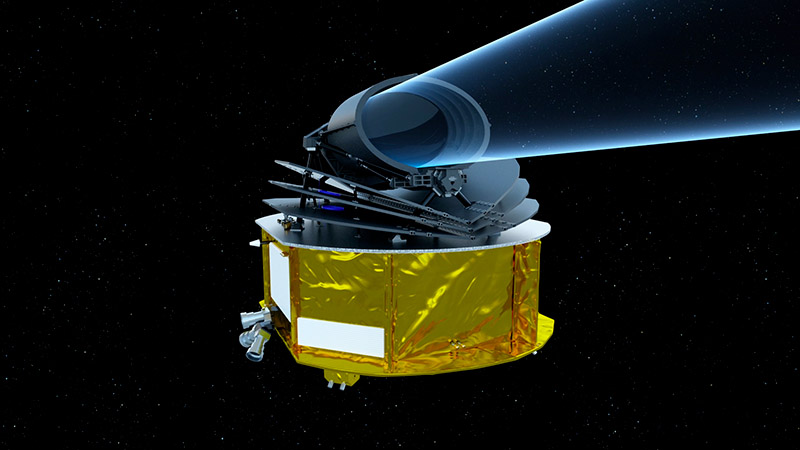IAP HELPS ORGANIZE THE ARIEL DATA CHALLENGE 2024
Since 2019, UCL's (University College London) Ariel team has organized an annual open competition on a specific problem related to ESA's Ariel mission. The Ariel mission (scheduled for launch in 2029) will study exoplanets by transit spectroscopy around bright stars. An Ariel working group has been studying artificial intelligence methods for data reduction and interpretation for over five years.
 Figure 1: Ariel spacecraft Credit: ESA/STFC RAL Space/UCL/UK Space Agency/ ATG Medialab
Figure 1: Ariel spacecraft Credit: ESA/STFC RAL Space/UCL/UK Space Agency/ ATG Medialab
The IAP team led by Virginie Batista competed in the 2023 Ariel Data Challenge which tried to find the best methods to determine the composition of planetary atmospheres. This year, the group joined the Data Challenge organisation team. The 2024 challenge centres around processing of simulated data from the Ariel instruments (the AIRS spectrograph and the fine pointing system) to predict the noise transmission spectra of each of the associated planetary systems. Each source of noise was generated by Ariel's ExoSim instrument simulator, and include photon noise, jitter, and many other systematic errors. Virginie Batista and Angèle Syty, in collaboration with Orphée Faucoz from CNES, provide the participants with a preliminary machine learning solution (“baseline”), which they will have to improve on to obtain the best possible score in the competition. The model was developed using simple Convolutional Neural Network (CNN) techniques and the open source Keras deep learning libraries.
Ariel takes spectra of bright stars at low resolution for several hours to discover the signatures of a transiting planet's atmosphere. This scientific signal is deeply buried under systematic errors. Using simulated images from the AIRS spectro-imaging detector and telemetry information, we need to extract the planet's spectrum. The aim is to use AI to retrieve the planet's spectra and compare the efficiency of such techniques with conventional data reduction pipelines. The preparation of Ariel Data Challenge 2024 (ADC2024) at IAP has been greatly aided by high-performance computing resources on IAP's Infinity1 high performance cluster. However, the public challenge version must be accessible to mainstream computing resources. Data simplification and compression work has been carried out to assist participants.
Beyond these competitions, the long-term aim of using AI techniques for Ariel is to provide more accurate and faster techniques to improve on the classic inversion, simulation and reduction methods that form the basis of data preparation before ingestion by machine learning programs. While it is difficult to predict where these techniques will be in a few years' time, it is essential to explore this field, and this is the subject of an Ariel thesis, supervised at IAP, starting in October 2024.
The Ariel competition, which opens on August 2 of this Olympic year, is part of the NEURIPS (International Machine Learning conference). There is a prize of 50 000 $, and the winners will be invited to present their best results at the next Ariel Consortium meeting.
Notes
![]() 1. The IAP Cluster Infinity has been mainly supported by the Région Ile-de-France (DIM/ACAV).
1. The IAP Cluster Infinity has been mainly supported by the Région Ile-de-France (DIM/ACAV).
Contacts
- Virginie Batista (coordinator)
Institut d'astrophysique de Paris, CNRS, Sorbonne Université
Virginie [dot] Batista [at] iap [dot] fr
P. Drossart & J. P. Beaulieu (chercheurs) ; A. Syty (M2 trainee and future IAP PhD student) and the IAP Ariel team.
Links
![]() Main ADC website (lead: Dr. Kai Hou (Gordon) Yip, UCL): UCL/ADC2024
Main ADC website (lead: Dr. Kai Hou (Gordon) Yip, UCL): UCL/ADC2024
![]() CNES Press release (in French)
CNES Press release (in French)
Layout: Jean Mouette
August 2024
